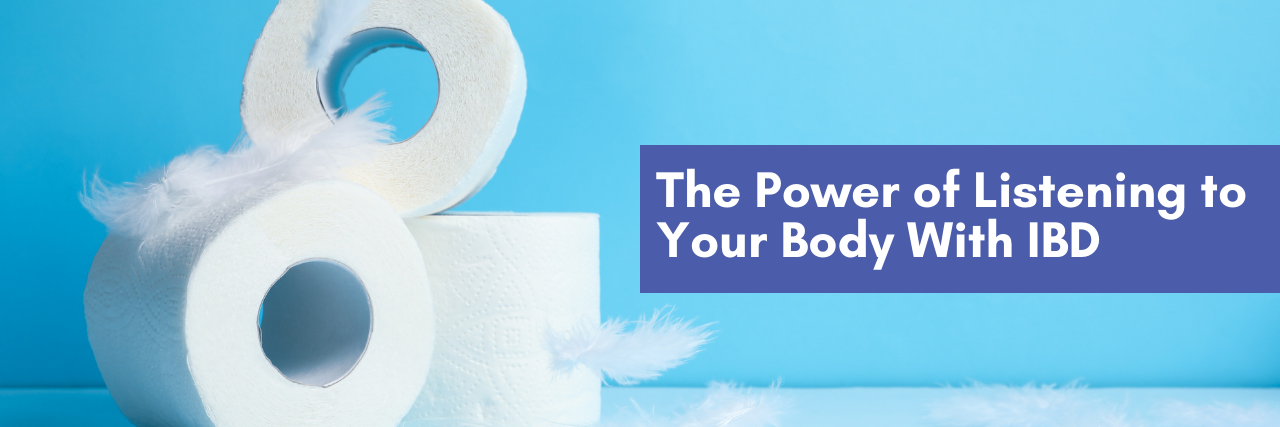As an athlete, I’ve been taught to always listen to my body. As a pregnant woman about to have her first child, I’ve been cautioned about not overdoing it. And as a person with a 20+ year history with ulcerative colitis (UC), I’ve had almost nobody tell me to do these things. I’ve learned them on my own – because it truly is the secret to physical and emotional survival when it comes to life with inflammatory bowel disease (IBD).
When I was diagnosed as a young 14-year-old in 2001, the biggest takeaway I had from those early appointments was to take some pills to feel better. That was it. Just take some pills. Oh, and by the way, you’ll have this forever. I was a budding track star and freshman in high school; there was no talk about navigating sports and activity with UC. There was no nutrition talk about how to fuel my body but also make sure I’m catering to a pesky gut. There was no talk about resting, buffer days, or any of that other “stuff” that, today, helps me get through life. The only familiarity I had with that topic was basing it around training fatigue, not chronic illness fatigue. So between then and now, I’ve been largely self-taught when it comes to understanding a body with IBD, especially as an active, pregnant person.
Since then, I’ve been blessed with great gastroenterologists, and their guidance has evolved with the times. Nowadays, there is way more talk about balance and tuning into your body than ever before. However, I still found myself ahead of the curve when it came to knowing how to do that. So many of my friends were (and are) experiencing flare-ups and physical burnout because of (I believe) the mentality to go, go, go, and not let IBD “win.” And while I respect that (I used to do that), that’s just not realistic with chronic illness – let alone one that literally empties your system out when you’re sick.
But how does one discover a balance that not only protects your physical health, but also ensures mental health doesn’t crack under the pressure? If you’re anything like me, days off, shortened exercise, or being realistic about my limits is a daily struggle. I’m stubborn, and I’m competitive, and pregnancy on top of UC has been a double whammy of really having to honor what my body needs.
So how did I get to this place, and why is it important? First of all, your inner dialogue matters so freaking much. That story you’re telling yourself – literally right now – about how you’re weak, worthless, tired, lame, whatever else? That’s 100% false. You get up every morning and do life while living with IBD. That right there is more than anyone else has taken on today. And the extra break you need during a walk, or that extra day off you need after a long week of activities? That’s not weakness; that’s being realistic and keeping your eye on the long game of staying healthy. That takes strength.
So task #1:
Practice talking to yourself the way you’d talk to a friend going through the same thing. Inner dialogue matters more than we realize; after all, it’s the loudest, most constant voice we hear every single day.
Second of all, literally no one else knows your body like you do. Not your doctors. Not your partner. Not your friends. Not the IBD community. Not your coach. You. So if you’re not listening, who is? If you think about it, the ability to tune into what you need to do for yourself is a pretty beautiful power to possess. If you make it a regular habit to be really, really honest with your limits and practice that positive self-talk when it’s time to take a break, no one else can really penetrate you with their comments or unsolicited advice. And you can bring that knowledge with you to doctor appointments to work as a teammate with your care team, knowing that you’re showing up for your 50% of treatment.
Task #2:
Remember that you’re a powerful human being who has an intimate understanding of your own body, if you choose to lean into it. Sit with it, listen in, and see what you notice. The more you consciously pay attention, the more you will trust your body and mind and what it needs.
Third of all, taking the time to develop a relationship with your body will pay big dividends in other areas of life. As we get older, our IBD can evolve and require new medications, treatments, increased regular screenings, or different conversations. All along the way, you can lean into that intimate knowledge and head into other life events more confident than ever. For example, all those buffer days you took, even when everyone else was out enjoying the day? You’ll appreciate that boundary when making larger plans down the line, knowing that you need those days and feeling confident to honor them. Good for you!
Task #3:
Be your own best friend. At the end of the day, how you feel is all that matters.
At the end of the day, life with IBD is a lot of trial and error, and everyone trips and falls once, twice – maybe even 10 times – along the way. But I’ve found consistency to be key once you get back up. The more you practice that gentle self-care of honoring yourself, the more natural it will come.

